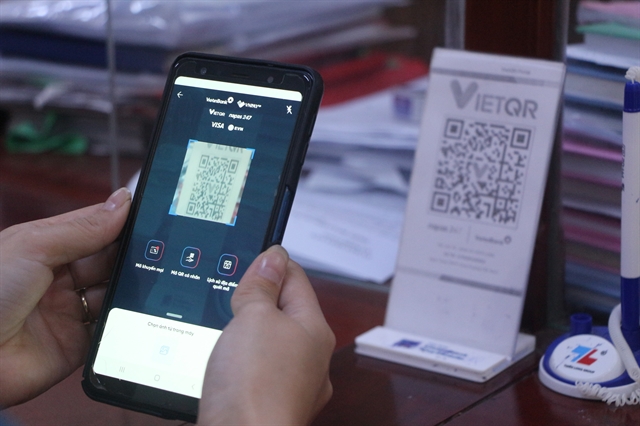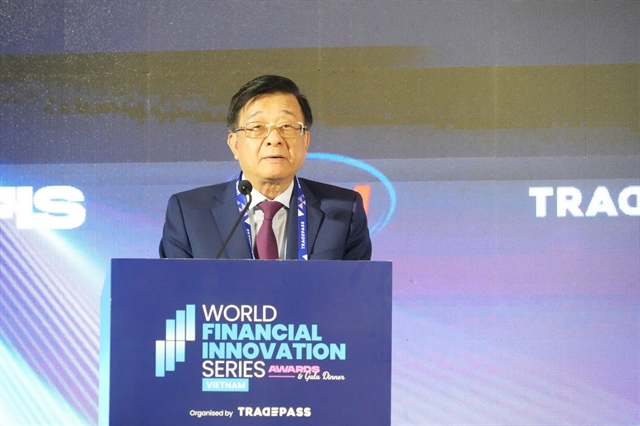 Economy
Economy

 |
| Vice Chairman and General Secretary of the Vietnam Banking Association, Nguyễn Quốc Hùng, speaks at the event. — VNS Photos |
HÀ NỘI — By early 2025, personal payment accounts in Việt Nam are expected to exceed 200 million, according to the Deputy Director of the Payment Department at the State Bank of Vietnam (SBV), Lê Anh Dũng,.
Dũng made the remarks during a two-day conference on World Financial Innovation Series 2025 starting in Hà Nội on Tuesday. He noted that many banks have successfully reduced their cost-to-income ratio (CIR) to below 30 per cent, showcasing improved efficiency through comprehensive digital transformation, positioning them alongside leading financial institutions in the region.
Dũng emphasised that Việt Nam is entering a pivotal phase of development, aiming to become a developed nation by 2045, as outlined in Resolution 57-NQ/TW by the Politburo. This resolution focuses on breakthroughs in science, technology and national digital transformation. In this context, digital transformation is not just a trend, but a crucial driver for sustainable economic growth, enhanced national competitiveness and improved quality of life.
The banking sector is vital to this transformation, playing a leading role in meeting customer demands and contributing to national digital goals. Recent years have seen significant advancements in the Vietnamese banking industry, aligning with the Digital Transformation Plan for the Banking Industry to 2025, (Decision 810/QĐ-NHNN).
To enhance operational efficiency, customer experience and risk management, credit institutions have heavily invested in advanced technologies such as artificial intelligence (AI), machine learning, big data, cloud computing and robotic process automation (RPA).
The trend of hyper-personalisation is emerging as a key highlight in the banking sector, enabling the provision of tailor-made products and services for each customer based on real-time data analysis and transaction context.
This approach has yielded impressive results, by early 2025, over 90 per cent of financial transactions at many credit institutions were conducted through digital channels. This achievement reflects the industry's commitment to focusing on customers, enhancing user experiences and delivering practical benefits.
Most banks have effectively used the National Population Database to implement customer identification via chip-embedded citizen identification cards. As a result, the number of personal payment accounts has surpassed 200 million, with transaction growth via the internet, mobile devices and QR codes reaching 35 per cent, 33 per cent, and 66 per cent respectively, compared to the same period in 2024. Many banks have successfully reduced their cost-to-income ratio (CIR) below 30 per cent, showcasing their efficiency and alignment with leading financial institutions in the region.
 |
| Participants at the conference in Hà Nội |
Lê Anh Dũng emphasised that these figures not only highlight the rapid pace of digital transformation but also illustrate financial inclusion, enabling tens of millions of people—especially in rural and remote areas—to access convenient and modern financial services.
According to Dũng the Vietnamese banking industry, while achieving significant progress in digital transformation, also faces several challenges.
The foremost challenge is ensuring network security and data protection. High-tech attacks, such as deepfake technology and identity fraud, are becoming increasingly sophisticated and widespread, necessitating robust security measures.
There is an ongoing need to invest in modern technology infrastructure and develop human resources equipped with digital skills. This requires coordinated efforts among management agencies, credit institutions and technology partners to address these gaps effectively. The legal framework must continue to evolve to keep pace with technological advancements and emerging business models. It is crucial to strike a balance between encouraging innovation and ensuring system stability, safety and consumer protection.
The Vice Chairman and General Secretary of the Vietnam Banking Association, Nguyễn Quốc Hùng, highlighted the significant impact of digital transformation in the banking sector. Through this transformation, banks are able to offer practical products and services that enhance user experience for both individuals and businesses. This effort aligns with the government's Project 06, focusing on modernisation and efficiency.
Key advancements include the implementation of biometric authentication and one-touch payment systems via QR codes. Furthermore, the banking industry is actively leveraging artificial intelligence in two primary areas:
AI is used for forecasting and optimising business operations. AI helps in identifying fraud and money laundering risks, ensuring compliance with regulations.
In addition, banks are enhancing online public services, integrating them with the National Public Service Portal. Currently, over 90 per cent of work records are managed online, with nearly 14.6 million accounts and 46.2 million records submitted through the portal. The system has facilitated approximately 26.8 million online payment transactions, amounting to more than VNĐ12.9 trillion (US$516 million). This comprehensive approach underscores the commitment of the banking sector to innovate and improve service delivery through technology.
At the sideline of the event, Praveen Venu, co-founder of the Indian Tradepass - the organiser of the event - said digital transformation is becoming increasingly critical across all sectors, particularly in the financial services industry. In Việt Nam, there is a significant surge in interest from digital banks and technology providers eager to showcase their capabilities to financial institutions.
The exhibition features impressive companies introducing cutting-edge digital transformation solutions. Topics of great interest include digital banking, AI in banking, cybersecurity in the financial sector and customer experience. These subjects will be focal points of discussion throughout the two-day event.
“We have seen remarkable engagement not only from delegates but also from many technology providers, all eager to participate in this vital conversation. The impact of digital banking in Việt Nam is substantial, with a growing number of Neo banks emerging across Southeast Asia, positioning Việt Nam as a promising market for this model,” he said.— VNS




